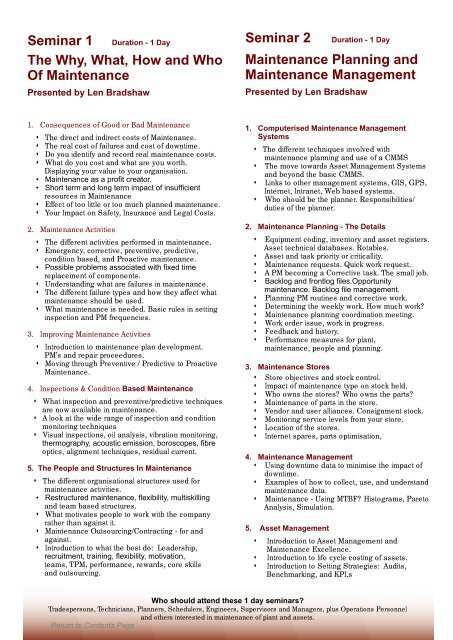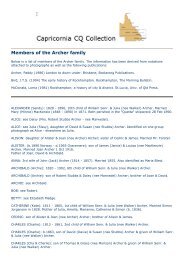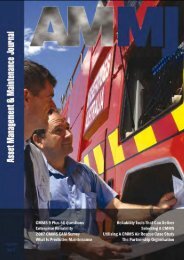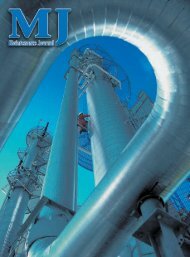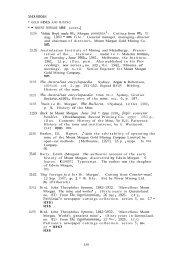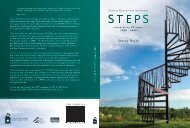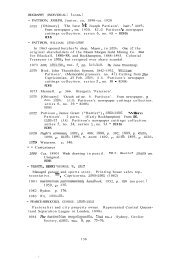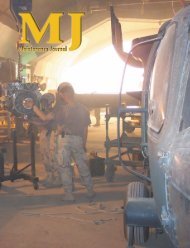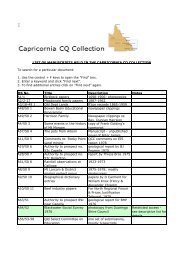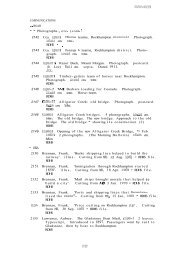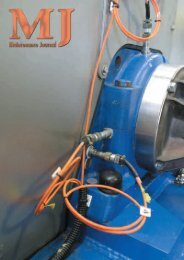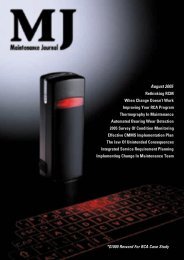April - Library
April - Library
April - Library
Create successful ePaper yourself
Turn your PDF publications into a flip-book with our unique Google optimized e-Paper software.
Seminar 1 Duration - 1 Day<br />
The Why, What, How and Who<br />
Of Maintenance<br />
Presented by Len Bradshaw<br />
1. Consequences of Good or Bad Maintenance<br />
• The direct and indirect costs of Maintenance.<br />
• The real cost of failures and cost of downtime.<br />
• Do you identify and record real maintenance costs.<br />
• What do you cost and what are you worth.<br />
Displaying your value to your organisation.<br />
• Maintenance as a profit creator.<br />
• Short term and long term impact of insufficient<br />
resources in Maintenance<br />
• Effect of too little or too much planned maintenance.<br />
• Your Impact on Safety, Insurance and Legal Costs.<br />
2. Maintenance Activities<br />
• The different activities performed in maintenance.<br />
• Emergency, corrective, preventive, predictive,<br />
condition based, and Proactive maintenance.<br />
• Possible problems associated with fixed time<br />
replacement of components.<br />
• Understanding what are failures in maintenance.<br />
• The different failure types and how they affect what<br />
maintenance should be used.<br />
• What maintenance is needed. Basic rules in setting<br />
inspection and PM frequencies.<br />
3. Improving Maintenance Activities<br />
• Introduction to maintenance plan development.<br />
PM’s and repair proceedures.<br />
• Moving through Preventive / Predictive to Proactive<br />
Maintenance.<br />
4. Inspections & Condition Based Maintenance<br />
• What inspection and preventive/predictive techniques<br />
are now available in maintenance.<br />
• A look at the wide range of inspection and condition<br />
monitoring techniques<br />
• Visual inspections, oil analysis, vibration monitoring,<br />
thermography, acoustic emission, boroscopes, fibre<br />
optics, alignment techniques, residual current.<br />
5. The People and Structures In Maintenance<br />
• The different organisational structures used for<br />
maintenance activities.<br />
• Restructured maintenance, flexibility, multiskilling<br />
and team based structures.<br />
• What motivates people to work with the company<br />
rather than against it.<br />
• Maintenance Outsourcing/Contracting - for and<br />
against.<br />
• Introduction to what the best do: Leadership,<br />
recruitment, training, flexibility, motivation,<br />
teams, TPM, performance, rewards, core skills<br />
and outsourcing.<br />
Seminar 2 Duration - 1 Day<br />
Maintenance Planning and<br />
Maintenance Management<br />
Presented by Len Bradshaw<br />
1. Computerised Maintenance Management<br />
Systems<br />
• The different techniques involved with<br />
maintenance planning and use of a CMMS<br />
• The move towards Asset Management Systems<br />
and beyond the basic CMMS.<br />
• Links to other management systems, GIS, GPS,<br />
Internet, Intranet, Web based systems.<br />
• Who should be the planner. Responsibilities/<br />
duties of the planner.<br />
2. Maintenance Planning - The Details<br />
• Equipment coding, inventory and asset registers.<br />
Asset technical databases. Rotables.<br />
• Asset and task priority or criticallity.<br />
• Maintenance requests. Quick work request.<br />
• A PM becoming a Corrective task. The small job.<br />
• Backlog and frontlog files.Opportunity<br />
maintenance. Backlog file management.<br />
• Planning PM routines and corrective work.<br />
• Determining the weekly work. How much work?<br />
• Maintenance planning coordination meeting.<br />
• Work order issue, work in progress.<br />
• Feedback and history.<br />
• Performance measures for plant,<br />
maintenance, people and planning.<br />
3. Maintenance Stores<br />
• Store objectives and stock control.<br />
• Impact of maintenance type on stock held.<br />
• Who owns the stores? Who owns the parts?<br />
• Maintenance of parts in the store.<br />
• Vendor and user alliances. Consignment stock.<br />
• Monitoring service levels from your store.<br />
• Location of the stores.<br />
• Internet spares, parts optimisation,<br />
4. Maintenance Management<br />
• Using downtime data to minimise the impact of<br />
downtime.<br />
• Examples of how to collect, use, and understand<br />
maintenance data.<br />
• Maintenance - Using MTBF? Histograms, Pareto<br />
Analysis, Simulation.<br />
5. Asset Management<br />
• Introduction to Asset Management and<br />
Maintenance Excellence.<br />
• Introduction to life cycle costing of assets.<br />
• Introduction to Setting Strategies: Audits,<br />
Benchmarking, and KPI,s<br />
Who should attend these 1 day seminars?<br />
Tradespersons, Technicians, Planners, Schedulers, Engineers, Supervisors and Managers, plus Operations Personnel<br />
and others interested in maintenance of plant and assets.


